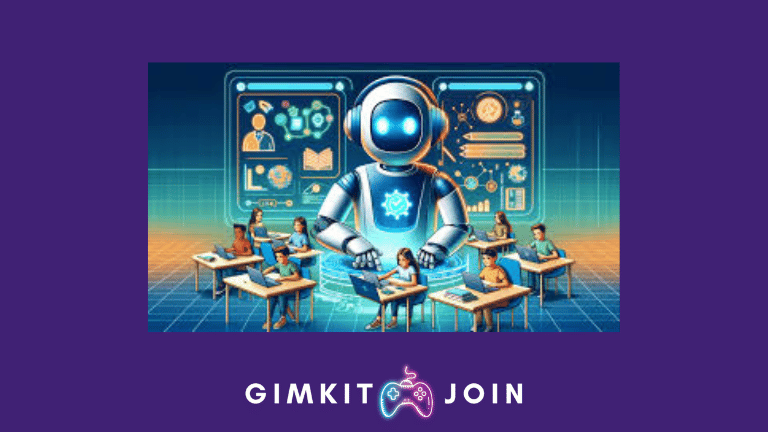Flood Gimkit with Bots
Flood Gimkit with Bots. One such potential exploit involves flooding Gimkit, a popular educational platform, with bots – automated programs designed to participate in quizzes and games. While this tactic may seem harmless on the surface, it raises significant ethical concerns and could have far-reaching consequences for both users and the platform itself. In this comprehensive guide, we’ll explore the implications of flooding Gimkit with bots, delve into the ethical considerations, and provide insights to help educators, students, and platform administrators navigate this complex issue.
Understanding Gimkit and the Rise of Educational Technology
Before we dive into the specifics of flooding Gimkit join with bots, it’s essential to understand the broader context of educational technology and the role platforms like Gimkit play in modern learning environments.
The Evolution of Gamified Learning
Gamified learning has emerged as a powerful tool for engaging students and fostering active participation in the educational process. By incorporating elements of gameplay, competition, and interactive quizzes, platforms like Gimkit aim to capture students’ attention and make learning more enjoyable and immersive.
Gimkit, in particular, has gained significant popularity among educators and students alike, offering a platform for creating and participating in interactive quizzes and games. Its gamification features, such as live competitions, leaderboards, and achievements, have proven effective in motivating students and enhancing their overall learning experience.
The Importance of Integrity in Educational Technology
As educational technology continues to evolve and become more prevalent in classrooms, it is crucial to maintain a strong emphasis on integrity and ethical practices. These platforms are designed to facilitate learning and personal growth, and any attempts to exploit or manipulate them for personal gain undermine their core purpose and could have far-reaching consequences.
Ensuring the integrity of educational technology platforms not only protects the learning experience for all users but also upholds the trust and credibility of the platforms themselves. A breach of integrity could erode confidence in these tools and hinder their adoption and effectiveness in educational settings.
Ethical Considerations in the Digital Age
The rise of digital technologies and online platforms has brought with it a host of ethical considerations that must be carefully navigated. Issues such as data privacy, intellectual property rights, and responsible use of technology are at the forefront of discussions surrounding ethical practices in the digital age.
In the context of educational technology, additional ethical considerations come into play, such as maintaining a fair and equitable learning environment, promoting academic integrity, and fostering a culture of respect and responsibility among students and educators alike.
Flooding Gimkit with Bots: The Ethical Dilemma
At its core, the act of flooding Gimkit with bots raises significant ethical concerns and challenges the principles of fairness, academic integrity, and responsible use of technology. It is essential to carefully examine the implications and potential consequences of this practice from multiple perspectives.
Understanding the Motivation Behind Bot Flooding
Before delving into the ethical implications, it’s important to understand the potential motivations behind flooding Gimkit with bots. Some possible reasons could include:
- Gaining an Unfair Advantage: Students may be tempted to use bots to gain an unfair advantage in quizzes or competitions, boosting their scores or rankings without putting in the necessary effort or demonstrating genuine understanding.
- Exploiting Vulnerabilities: Some individuals may view the ability to flood Gimkit with bots as a challenge or an opportunity to test the platform’s vulnerabilities and security measures.
- Disrupting the Learning Environment: In some cases, bot flooding could be motivated by malicious intent, with the goal of disrupting the learning environment or causing chaos within the platform.
- Curiosity and Experimentation: Developers or technically inclined individuals may be driven by curiosity and a desire to experiment with automated systems or test the limits of the platform’s functionality.
Regardless of the motivation, it’s crucial to recognize that flooding Gimkit with bots can have far-reaching consequences that extend beyond the immediate impact on the platform itself.
Violations of Academic Integrity and Fairness
One of the most significant ethical concerns surrounding the use of bots on Gimkit is the violation of academic integrity and fairness principles. By leveraging automated programs to participate in quizzes and games, users are essentially engaging in a form of cheating or gaining an unfair advantage over other participants.
Academic integrity is a cornerstone of the educational system, and any actions that undermine it threaten the credibility and value of the learning experience. When students resort to using bots or other forms of cheating, they not only compromise their own learning but also create an uneven playing field for their peers.
Moreover, the use of bots on Gimkit can skew the platform’s analytics and reporting systems, providing inaccurate data and potentially misleading educators about students’ actual performance and understanding. This could lead to flawed assessments and ineffective instructional decisions, ultimately hindering the learning process.
Disruption of the Learning Environment
Flooding Gimkit with bots can also disrupt the intended learning environment and detract from the platform’s primary purpose of facilitating engaging and interactive educational experiences. When bots participate in quizzes and games, they can potentially dominate leaderboards, distort competition dynamics, and diminish the sense of achievement and motivation for genuine participants.
Additionally, bot flooding can strain the platform’s resources and potentially cause performance issues or outages, negatively impacting the user experience for all participants. This could lead to frustration, disengagement, and a loss of trust in the platform’s reliability and effectiveness as a learning tool.
Ethical Implications for Platform Developers and Administrators
The ethical implications of flooding Gimkit with bots extend beyond the actions of individual users. Platform developers and administrators also bear a responsibility to maintain the integrity and security of their systems, as well as to uphold ethical standards in the development and management of educational technology tools.
Developers and administrators must ensure that their platforms are designed with robust security measures and safeguards against potential exploits or bot attacks. Failing to do so could not only compromise the user experience but also expose the platform to legal liabilities and reputational damage.
Furthermore, platform administrators have an ethical obligation to monitor and address any potential misuse or exploitation of their systems, including bot flooding incidents. They must establish clear policies and guidelines regarding acceptable use and take appropriate actions to maintain a fair and secure learning environment for all users.
Legal and Regulatory Implications
In addition to the ethical considerations, flooding Gimkit with bots may also have legal and regulatory implications, depending on the specific circumstances and jurisdictions involved. Some potential legal issues to consider include:
- Computer Fraud and Abuse: Depending on the methods used to deploy bots and the extent of the disruption caused, bot flooding activities could potentially fall under computer fraud and abuse laws, which prohibit unauthorized access or interference with computer systems.
- Intellectual Property Infringement: If the bots involve the unauthorized use or reproduction of copyrighted materials or proprietary code, there could be implications related to intellectual property rights and infringement.
- Privacy and Data Protection: Depending on the nature of the bot activities and the data involved, there may be potential violations of privacy and data protection regulations, particularly if the bots access or misuse user data without proper authorization.
- Terms of Service Violations: Most online platforms, including Gimkit, have terms of service agreements that users must adhere to. Bot flooding activities could potentially violate these terms, leading to account suspensions or legal actions.
It’s important to note that legal implications can vary widely depending on the specific circumstances and the laws and regulations in the relevant jurisdictions. Seeking professional legal advice is recommended for any activities that may raise legal concerns.
Mitigating the Risks and Promoting Ethical Practices
While the temptation to flood Gimkit with bots may exist, it is essential to prioritize ethical practices and responsible use of educational technology. By promoting a culture of integrity and implementing proactive measures, educators, students, and platform administrators can mitigate the risks associated with bot flooding and ensure a fair and engaging learning environment.
Raising Awareness and Educating Users
One of the most effective strategies for promoting ethical practices is to raise awareness and educate users about the implications and consequences of flooding Gimkit with bots. This can be achieved through various channels, such as:
- Classroom Discussions: Educators can initiate open discussions with their students about academic integrity, responsible use of technology, and the potential impacts of exploiting platforms like Gimkit.
- Educational Campaigns: Platform administrators and educational institutions can launch awareness campaigns that highlight the importance of ethical practices and the consequences of misusing educational technology tools.
- User Agreements and Policies: Clear and comprehensive user agreements and policies should be in place, explicitly stating the prohibited actions, such as bot flooding, and outlining the potential consequences for violations.
- Training and Professional Development: Providing training and professional development opportunities for educators can equip them with the knowledge and skills to effectively.

FAQs
What is flooding Gimkit with bots?
Flooding Gimkit with bots refers to the practice of using automated scripts or programs to join a Gimkit game repeatedly, overwhelming the game with fake players.
Is flooding Gimkit with bots allowed?
No, flooding Gimkit with bots is against the terms of service of the platform. It can disrupt the game for legitimate players and is considered cheating.
What are the consequences of flooding Gimkit with bots?
Flooding Gimkit with bots can result in the suspension or banning of the account responsible for the flooding. It can also lead to the game being canceled or the game creator being penalized.
How can I report someone for flooding Gimkit with bots?
If you suspect that someone is flooding Gimkit with bots, you can report them to the Gimkit support team. Provide as much information as possible, such as the username of the suspected bot user and the game ID.
How can I prevent my Gimkit game from being flooded with bots?
To prevent your Gimkit game from being flooded with bots, you can enable the “Require Login” option when creating the game. This will require players to log in with a Gimkit account before joining the game, which can help deter bots.


![Is Gimkit Free for Students? [2024]](https://gimkitjoin.uk/wp-content/uploads/2024/04/Is-Gimkit-Free-for-Students.png)


![How Does Gimkit Join Work? [2024]](https://gimkitjoin.uk/wp-content/uploads/2024/05/How-Does-Gimkit-Join-Work.png)
